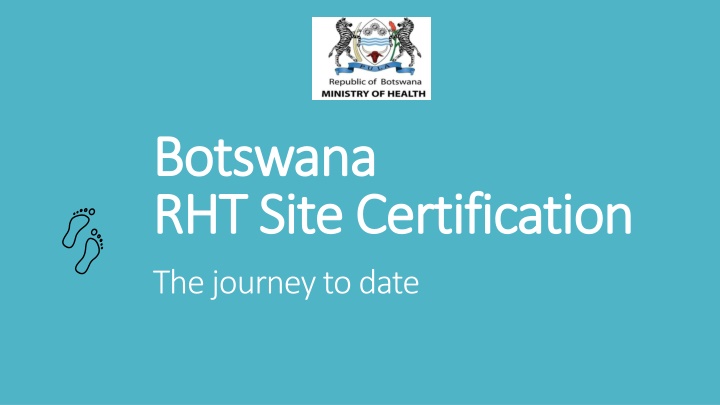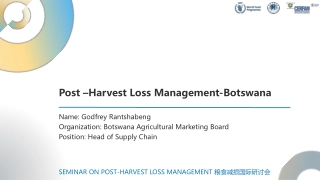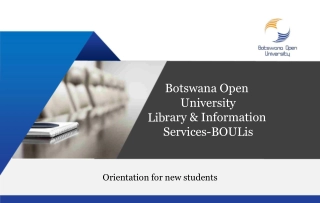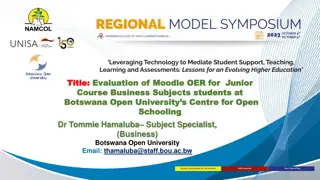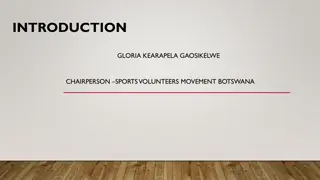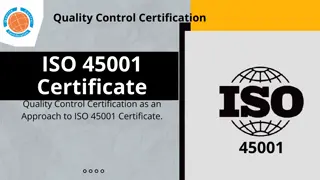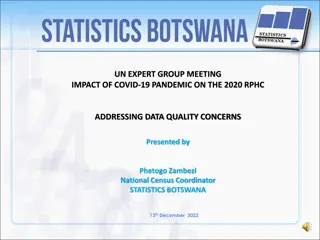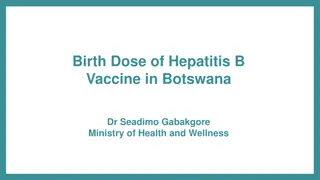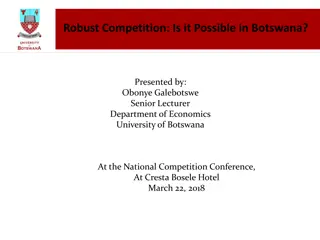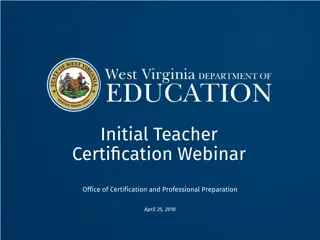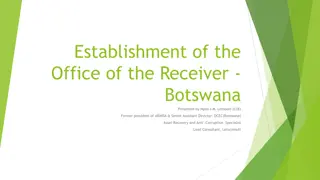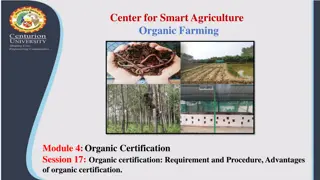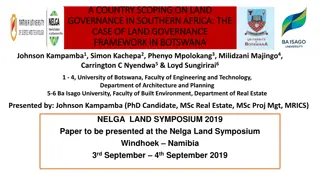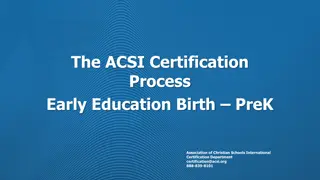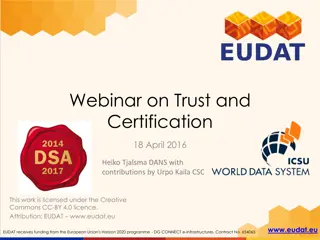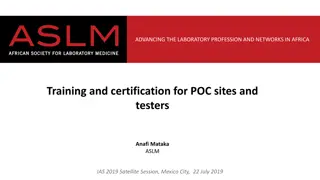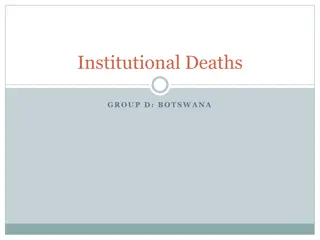Botswana RHT Site Certification Journey to Date
The overview covers Botswana's RHT site certification process, including the structure of the certification program, national curriculum details, tools for data management, and lessons learned. It outlines a stepwise process to certification involving training of TOTs, data management through RHTCQI PT and QC tools, and current challenges in site certification. The steps to tester certification detail activities from reviewing the national curriculum to in-country training sessions and ongoing mentorship. Additionally, the distribution of Lab Master Trainers and Auditors in 2024 is highlighted, along with the national performance of SPI-RRT sites during audits in 2019 and 2023.
Download Presentation

Please find below an Image/Link to download the presentation.
The content on the website is provided AS IS for your information and personal use only. It may not be sold, licensed, or shared on other websites without obtaining consent from the author.If you encounter any issues during the download, it is possible that the publisher has removed the file from their server.
You are allowed to download the files provided on this website for personal or commercial use, subject to the condition that they are used lawfully. All files are the property of their respective owners.
The content on the website is provided AS IS for your information and personal use only. It may not be sold, licensed, or shared on other websites without obtaining consent from the author.
E N D
Presentation Transcript
Botswana Botswana RHT Site Certification RHT Site Certification The journey to date
Outline Outline Overview of country tester certification Structure of certification program National curriculum Tool used for certification data management Lessons learnt
Stepwise Process to Certification 1 Training of TOTs Use standardized training curriculum to upskill Master Trainers to TOT level Development of training plan Training needs based on gaps identified through CQI projects and program needs TOTs deliver competency- based training Testers not attaining competency are followed, retrained and reassessed by assigned master Trainer. Mentorship, and site support towards site accreditation Data management RHTCQI PT, QC Use ODK installed on tablets to conduct assessment SPi-RRT tool to conduct site assessments Grading of different components of RTCQI RHT sites. Data management: (SPI-RRT dashboards) Site certification Currently site reaching level 4 rating not certified due to no certification body & framework
Stepwise Process to Tester Certification -2 March March 2018 2018 June 2018 June 2018 2018 2019 Review of National Curriculum for TOTs and testers August August 2023 2023 2012 2012 March 2019 March 2019 2010 2010 2010 2010 In-country SPI-RT Training of 15 additional TOTs PT Panel Production for testers by BNQAL Initial Training of 10 LMTs on SPI-RRT by CDC Atlanta Inception of LMT Program 109 SPI-RRT sites audited Development of TOT curriculum 256 SPI- RRT sites audited Initial training of LMTs Training of POCT testers (PMTCT lay counsellors, HCWs) Continuous mentorship & support of testing sites by LMTs
2024 Lab Master Trainer & Auditor distribution 2024 Lab Master Trainer & Auditor distribution Key Key Lab Master trainer SPI-RRT Auditor BNQAL Nata Masunga Palapye 84 Lab Master trainers 84 Lab Master trainers Of which are 18 SPI auditors auditors Sefhare 18 SPI- -RRT RRT Based at 48 government labs 1 private lab 2 Implementing partners Goodhope
National SPI-RRT Performance % of sites at different SPI % of sites at different SPI- -RRT levels during national audits RRT levels during national audits in 2019 (n = 109) and 2023 (n = 256) in 2019 (n = 109) and 2023 (n = 256) % SPI % SPI- -RRT Scores per quality essential element for RRT Scores per quality essential element for national audits in 2019 (n = 109) and 2023 (n =256 national audits in 2019 (n = 109) and 2023 (n =256) 70% Personnel & Training Certification 62% 60% 90 80 70 50% EQA and site supervision 60 Physical Facility 50 39% Percentage 40% 40 34% 30 20 30% 10 21% 0 20% 15% 14% Post-testing phase Safety 7% 10% 6% 1% 0% 0% Level 0 Level 1 Level 2 Level 3 Level 4 Testing phase Pre-testing Phase SPI-RRT levels 2019 2023 2019 2023
Structure of Certification Program Resources Resources National curriculum Trained TOT s SPI-RRT Auditors Lab Master trainers District focal persons Training of testers PT testing participation and performance Quality control Standardized log books Standardized quality assurance tools Equipment (timers, thermometers) Ministry of Health Department of Technical Support Services Oversight Technical Advisory & Certification Body University of Botswana Centre for Disease Control Botswana MoH National Health Laboratory Implementers Bummhi
National curriculum Development & Implementation National Curriculum Development National Curriculum Development All HIV Point of Care testing curriculum is developed by Ministry of Health by the POCT TWG (Lab) and HTS TWG (Counselling). TWGs consist of technical advisors and SPI-RRT auditors from stakeholders including implementing partners, PEPFAR agencies ie. USAID and CDC, NAPHA Laboratory Master Trainers Laboratory Master Trainers The laboratory master trainer are lab technologists based at district laboratories and implementing partners Perform direct observations, corrective actions, support/mentorship visits, monitor stock levels, monitor indicators, Training HTS providers on testing/laboratory component HTS Focal Persons HTS Focal Persons Program officers at districts who coordinate HTS programming activities Provides technical oversight on counselling Use curriculum to train HTS on counselling component District Monitoring & Evaluation Officers District Monitoring & Evaluation Officers Monitors reporting by facilities and partners and analyse districts data to report to relevant stake holders Train HTS providers on HTS electronic Medical Records EMRs such as IPMS, dHIS2, PIMS, ODK HTS Providers HTS Providers HTS providers include; Testers Key Population Peer Outreach Workers, HIVST distributors Provide education and counselling to clients seeking testing through health talks Community/Clients Community/Clients Receive information on testing services & ask questions to gain comprehensive understanding. .
Data Management Tools ODK App with SPI-RRT checklist v4.0 configured on tablets and used during audits Completed audit data with geo-coordinates is synced to Cloud Server at National Health Lab Data visualisation on SPI-RRT Dashboard
In In- -country training country training of TOTS as SPI of TOTS as SPI- -RRT auditors auditors Staff attrition, logistics Need to train more LMTs/TOTs as SPI-RRT auditors Lessons Learnt RRT Assessment need Assessment need for mobile & for mobile & outreach testing outreach testing settings settings Mobile & Outreach testing by CSOs, IPs significantly increased Need for standardized assessment checklist for testing settings Previous challenges with identifying certification body Collaboration resolved previous challenges to site certification Stakeholder Stakeholder engagement & engagement & collaboration collaboration
RTCQI certification scope of work developed Engaged University of Botswana as certification body Workplan developed MOU between MOH and UB Finalize the budget work plan Establish the exact number of target sites Way Forward Select the pool assessors based on target sites MOH and Bummhi to prioritize sites for mentorship & assessment Refresher training for the assessors Offered through TA from CDC Atlanta COP23 Q3 -Q4 Targeted sites assessed SPIRRT dashboards Conduct the assessments Certification of sites by UB Site certification
KE A LEBOGA! KE A LEBOGA!
